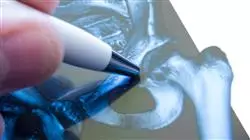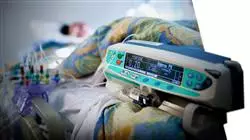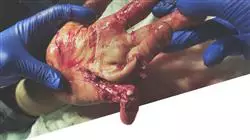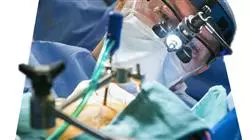University certificate
The world's largest faculty of medicine”
Description
Thanks to this professional master’s degree you will be able to combine your medical responsibilities with a first level update in Trauma”

In recent years, the improvement and technical progress in diagnostic devices such as computed tomography, portable ultrasound or advanced monitoring mark the evaluations of trauma patients in the ICU. At the same time, there have been notable advances in the medications used, all supported by scientific-medical studies. This scenario leads professionals to carry out daily multidisciplinary work and employ new therapeutic strategies.
Faced with this reality, doctors are constantly updating their skills and abilities to deal with complex clinical situations. For this reason, TECH has developed this professional master’s degree of 1,500 teaching hours, created by an excellent team of specialists with experience in hospitals.
This is a program that will lead the graduate to delve into the approach to emergent situations, rapid decision making and precise coordination with the different teams of specialists. It will also delve into the planning of rehabilitation and recovery of traumatized patients or the latest technology used in life support devices and advanced assessment tools.
A syllabus that acquires greater dynamism thanks to the multimedia pills and the wide variety of didactic resources such as specialized readings or case studies. In addition, the Relearning methodology used by this academic institution will allow the professional to achieve a much more effective update in a shorter period of time.
A unique opportunity to keep up-to-date through an online and flexible teaching option, which favors the compatibility of the most demanding daily responsibilities with a university proposal that is at the forefront.
Do you want to be aware of the most effective strategies for dealing with traumatized patients in special situations? Do it thanks to this program”
This professional master’s degree in Severe Trauma in the ICU contains the most complete and up-to-date scientific program on the market. The most important features include:
- The development of practical cases presented by experts in Severe Trauma in ICU
- The graphic, schematic, and practical contents with which they are created, provide scientific and practical information on the disciplines that are essential for professional practice
- Practical exercises where self-assessment can be used to improve learning
- Its special emphasis on innovative methodologies
- Theoretical lessons, questions to the expert, debate forums on controversial topics, and individual reflection assignments
- Content that is accessible from any fixed or portable device with an Internet connection
Delve into the prevention of complications and pain management in trauma with the best multimedia content”
The program’s teaching staff includes professionals from the field who contribute their work experience to this educational program, as well as renowned specialists from leading societies and prestigious universities.
Its multimedia content, developed with the latest educational technology, will allow the professional a situated and contextual learning, that is, a simulated environment that will provide an immersive education programmed to learn in real situations.
This program is designed around Problem-Based Learning, whereby the professional must try to solve the different professional practice situations that arise during the academic year For this purpose, the students will be assisted by an innovative interactive video system created by renowned and experienced experts.
Delve into the latest emergency response protocols, injury severity assessment and stabilization techniques”

Upgrade through the most comprehensive Severe Trauma ICU program created by the world's largest digital university”
Objectives
This university program of 1,500 teaching hours has been designed to offer the medical professional a complete update of their knowledge and skills for the management of the trauma patient in the ICU. In this way, the graduate at the end of this program will be up-to-date with the most advanced diagnostic and therapeutic strategies, advances in pharmacology and communication skills with the patient and the rest of the specialists and healthcare professionals involved in their clinical care.

Extend the information provided by this program even further with scientific literature that will show you the latest findings in the management of Severe Trauma in the ICU”
General Objectives
- Delve into a thorough understanding of the anatomophysiological, pathophysiological, and clinical basis of severe traumatic injuries, as well as associated complications and comorbidities
- Effectively communicate injury prevention information to different audiences and utilize health promotion strategies
- Delve into protocols for the prehospital management of specific trauma, such as head, chest, and orthopedic trauma
- Integrate quality and safety practices in the management of trauma patients, minimizing risks and optimizing outcomes
- Be aware of the specific nutritional requirements of severe trauma patients and develop appropriate nutrition plans
- Implement triage protocols in mass trauma situations and prioritize care
Specific Objectives
Module 1. Traumatic Disease in Public Health
- Apply the concepts of epidemiology to analyze the incidence, prevalence and patterns of traumatic injuries in the population
- Evaluate the impact of traumatic injuries on public health, considering economic, social and quality of life factors
- Analyze injury prevention programs, considering vulnerable populations and intervention strategies
- Delve into the role of health policy in the prevention and management of traumatic injuries, considering relevant regulations and legislation
- Interpret epidemiological data and assess traumatic injury trends, identifying areas of focus for effective interventions
- Plan public health responses to mass trauma situations, considering resource coordination and crisis management
- Evaluate the effectiveness of public health interventions in preventing traumatic injuries and adjust strategies according to the findings
Module 2. Prehospital Trauma Management
- Be aware of rapid and systematic assessments of trauma patients in prehospital settings
- Identify and prioritize prehospital management interventions according to patient severity and condition
- Establish strategies to ensure adequate ventilation
- Refresh techniques for controlling external and internal bleeding and minimizing blood loss in trauma situations
- Master safe immobilization techniques to prevent further damage and ensure adequate mobilization of trauma patients
- Update the medications used in prehospital management, their dosage and appropriate routes of administration
Module 3. Initial Trauma Care in the ICU Hospital
- Rapidly assess the severity and extent of traumatic injuries in patients admitted to the ICU
- Identify and prioritize medical and surgical interventions according to the urgency and stability of the patient
- Delve into techniques to restore hemodynamic stability and control shock in trauma patients
- Apply methods to control active bleeding and prevent excessive blood loss
- Interpret radiographs and other medical images to identify injuries and guide care
- Delve into strategies for pain management and sedation in trauma patients, considering their individual needs
Module 4. Management of Severe Trauma in ICU
- Evaluate advanced clinics to determine the severity and extent of traumatic injuries in critically ill patients
- Be up-to-date on the interpretation of diagnostic test results, such as medical imaging and laboratory tests, to identify injuries and complications
- Increase informed decision making about the most appropriate medical and surgical treatment for each trauma patient
- Master advanced strategies for managing shock and controlling bleeding in patients with severe traumatic injuries
- Perform advanced surgical procedures, such as damage control surgeries and tissue repair procedures
- Utilize advanced life support therapies, including mechanical ventilation and use of vasoactive medications
- Identify and manage common complications in trauma patients and develop long-term care plans
Module 5. Advanced ICU care
- Advance the clinical assessment of trauma patients in the ICU, identifying signs of shock, bleeding, and deterioration
- Manage and care for complex medical devices used in patients with severe traumatic injuries, such as catheters and probes
- Be up-to-date on the administration of specific medications for pain management, sedation, and shock control in trauma patients
- Update knowledge for interpretation and utilization of monitoring data, such as vital signs and hemodynamic parameters, to make care decisions
- Identify and prevent common complications in trauma patients in the ICU, such as infections and pressure ulcers
Module 6. Radiology, complications and rehabilitation in trauma in the ICU
- Delve into the interpretation of radiographs, computed tomography and magnetic resonance imaging to identify traumatic injuries
- Differentiate between acute injuries and pre-existing conditions on radiologic images of trauma patients
- Describe traumatic injuries in areas such as the musculoskeletal system, internal organs, and soft tissues
- Delve into the technologies and equipment used in medical imaging and understand how they influence diagnosis
- Delve into the role of the radiologist and develop skills in communicating radiologic findings to the health care team
- Delve into radiologic findings to make informed clinical decisions about the management and treatment of trauma patients
Module 7. Management of shock in ICU trauma
- Delve into the different types of shock in trauma patients in the ICU
- Delve into the interpretation of vital signs and hemodynamic parameters to assess the severity and progression of shock
- Learn the principles of intravenous fluid administration and its proper use to maintain perfusion
- Update knowledge of vasoactive medications and their mechanisms of action to correct hemodynamic imbalance
- Identify and address coagulation disorders associated with traumatic shock
- Develop strategies for recognizing and treating septic shock, a common complication in trauma patients
Module 8. Management of mild trauma in ICU
- Update knowledge of advanced clinical evaluations of patients with severe traumatic injuries in intensive care units
- Interpret diagnostic tests and clinical findings to identify and assess the extent of traumatic injuries
- Be up-to-date on techniques to control bleeding and prevent excessive blood loss in trauma patients
- Learn about the medical and surgical management of specific trauma, such as head and thoracic injuries
- Be aware of advanced medical technologies and life-sustaining therapies in the ICU for severe trauma patients
- Evaluate ethical and legal situations related to trauma management and make informed decisions
Module 9. Trauma Pharmacology and Nutrition
- Select and administer specific medications for pain management, sedation and shock control in trauma patients
- Update knowledge on appropriate dosages and routes of administration for different medications used in trauma patients
- Delve into the side effects and possible complications of medications used in the management of trauma patients
Module 10. Trauma in special situations
- Understand how traumatic injuries affect special populations such as children, the elderly and pregnant women
- Manage trauma situations in contexts of natural disasters, mass accidents and armed conflicts
- Delve into specific protocols and procedures for trauma management in special contexts

Learn from the comfort of your own home and at any time of the day about the approach to coagulation disorders associated with traumatic shock”
Professional Master's Degree in Severe Trauma in the ICU
At TECH Technological University, we offer you a unique opportunity to boost your career in the medical field with our Professional Master's Degree in Severe Trauma in the ICU. This cutting-edge academic program is designed for those healthcare professionals who wish to reach a higher level in the management of critical trauma cases in intensive care units. Our graduate program is completely online, which gives you the flexibility to learn at your own pace, regardless of your geographic location or work schedule. Online classes are taught by experts in the field of trauma, providing you with up-to-date knowledge and practical skills essential for dealing with emergency situations with confidence and skill. At TECH, we understand the importance of continuing education in the medical field, especially in critical areas such as severe trauma in ICU. Our program will immerse you in the world of the most complex traumatic injuries and provide you with the tools you need to make accurate and effective decisions at crucial times.
We understand the importance of continuing education in the medical field, especially in critical areas such as severe trauma in ICU.
Stand out in ICU medical care with this Professional Master's Degree
Some of the key topics you'll address during the program include initial assessment of the trauma patient, advanced fracture management techniques, hemorrhage control and treatment of vital organ injuries. In addition, you will learn how to work efficiently as a team in critical care settings, which is essential to providing quality care. With a focus on clinical practice and the application of the latest research in trauma, our Professional Master's Degree in Severe Trauma in the ICU will prepare you to meet the most demanding challenges in critical patient care. You'll gain a competitive edge in your career and be able to make a difference in the lives of those in need of high-quality medical care. Take a step forward in your career and become an expert in severe trauma in ICU! Join TECH Technological University and transform your professional future. Your success in medicine deserves the best possible program.







